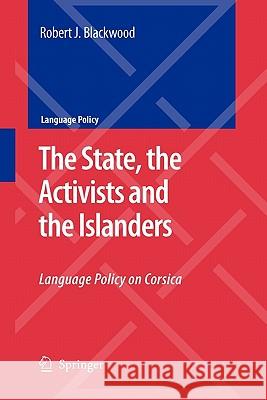The State, the Activists and the Islanders: Language Policy on Corsica » książka



The State, the Activists and the Islanders: Language Policy on Corsica
ISBN-13: 9789048178636 / Angielski / Miękka / 2010 / 164 str.
The State, the Activists and the Islanders: Language Policy on Corsica
ISBN-13: 9789048178636 / Angielski / Miękka / 2010 / 164 str.
(netto: 383,36 VAT: 5%)
Najniższa cena z 30 dni: 385,52
ok. 16-18 dni roboczych.
Darmowa dostawa!
This analysis of language policy on Corsica provides the first study of the three levels of language policy existing on the Mediterranean island of Corsica. It focuses on the key participants - the State, the language activists and the islanders.
From the reviews:
"Robert Blackwood's book fills a gap in the literature on the 'languages of France'. ... a very welcome addition to the library bookshelf. ... the text very easy to follow and also allows the reader to go directly to the era that is of interest. There is a lot of detail in the history of the political context of language shift, language spread and language decline. ... This book is excellent for showing us the way that the political shapes language attitudes and behaviour." (Sue Wright, Language Policy, Vol. 8, 2009)
"Corsican has been relatively negelected in the literature on France's regional or 'heritage' languages, even though it is probably the best protected of them all, thanks to the Matignon Agreements of 2000. This thorough and detailed study goes a long way towards making good the deficiency." (Rodney Ball, University of Southampton)
"This book offers an historical account of ... Corsican language emerged from its status ... . book presents a fascinating and authoritative historical account of the fluctuating status of Corsican ... . the book provide an interesting overview of the language situation in Corsica ... additionally it offers a valuable study of the consequences of government neglect, or at times even hostility towards a heritage language and also the limitations and problems associated with trying to support a threatened language through the education system." (David Deterding, Journal of Sociolinguistics, Vol. 14 (2), 2010)
"This is the first book-length study of language policy on Corsica ... . The book is divided into eight chapters, an extremely useful bibliography, and an index ... . is informative and insightful, and which will be of real use and interest to French scholars, historians and sociolinguists." (Philip Riley, Journal of Multilingual and Multicultural Development, Vol. 31 (4), July, 2010)
Chapter One. Corsica, the poor relation. Defining language policy. Manipulation and intervention. The principal actors. Motivation. Reversing a language shift. The warp and the weft of language policy on Corsica.-
Chapter Two. Corsica, a Genoese island. Corsica and the Ancien Régime. The Revolution of 1789. The Revolution on Corsica. The Revolutionaries and language attitudes. Language management in a new France. Post-Revolutionary language management – a Corsican perspective. Empire and the French century. Language-in-education planning in the nineteenth century. The Napoléonic Era. The July Monarchy and the Second Empire.-
Chapter Three. The Third Republic and a new century. Ferry and language-in-education policies. The national stage.- The Corsican dimension. Corsica’s linguistic landscape. Extra-linguistic factors in language beliefs and practices. Language activism and the seeds of regionalism. Language beliefs and the spectre of Mussolini. War, occupation and the myth of a Latin brotherhood. The Post-War Period. Language management from the French Republic. Post-war language activism. The islanders’ response.-
Chapter Four. The loi Deixonne – language management against the grain. Language activism influencing language management. Decolonisation and the growth of regionalism. The overshadowing of language activism. Language management to defend French.Language management to cloister Corsican. Aléria. Language activism in the 1970s.Three strands of language management. Language activism and reversing the language shift.-
Chapter Five. The final decades of the twentieth century. Decentralisation for France, devolution for Corsica. Language activists within the administration of Corsica. La Collectivité Territoriale de Corse.- Language management to defend French. New agents in language policy. The European Charter for Regional or Minority Languages. The French State’s response to the Charter. The Charter in a Corsican context. The local implications of the national impasse.-
Chapter Six. Language beliefs influencing language management. Interpreting language management from Paris. The circulaire Bayrou on Corsica. The Matignon Accords – another threshold crossed. Evaluating the progress of Corsican language education. A new plan for language management. An acknowledgement of language realities. Language management beyond the school precincts. Action plans for language management.-
Chapter Seven. The islanders – a longitudinal study. Procedures. Types of question. The profiles of the respondents. Results. Basic language practices. Corsican spoken in families. Non-corsophones learning Corsican. Corsican as a marker of identity. The response to language management. Mother-tongue transmission. The first stage – language beliefs. The second stage – the evolution of beliefs into practices. The distribution of responsibilities according to personal ability.-
Chapter Eight. The conclusions – two languages, two policies? The language activists. The State. The islanders. Appendix A. Bibliography.
This analysis of language policy on Corsica provides the first study of the three levels of language policy existing on the Mediterranean island of Corsica. It focuses on the key participants - the State, the language activists and the islanders - in the language debate that has taken place across the island since its purchase by France. This book is informed by recent work on language planning, both theoretical and relating to specific case studies. At the same time, it engages with trends in sociolinguistics over the past decades, which have included language planning in their investigations of languages in contact, language obsolescence and language death. A central premise of this book is that the three discrete categories of participants in the language debate are closely interrelated and that the status and position of Corsican in relation to French cannot be understood without a thorough exploration of these three strands. This volume will appeal to researchers and students in French Studies, sociolinguistics, and especially language policy.
1997-2026 DolnySlask.com Agencja Internetowa
KrainaKsiazek.PL - Księgarnia Internetowa









